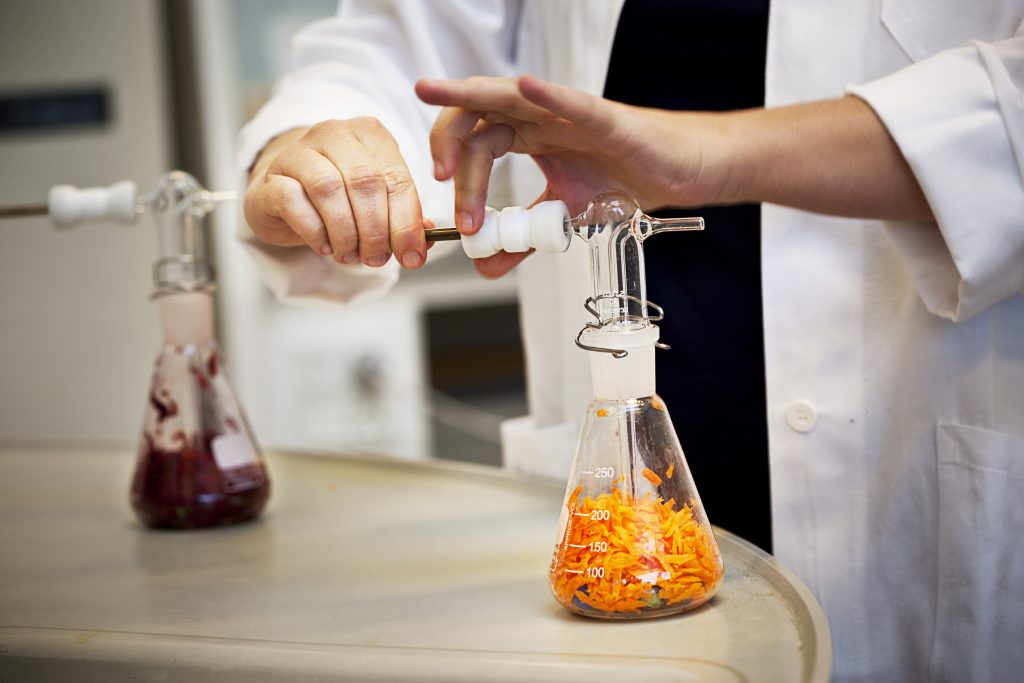Denmark (Aarhus University) Plant2Food will put Denmark at the forefront in the development of plant-based foods

The new collaborative platform, Plant2Food, will be a gathering point for researchers and companies who want to work together to solve some of the complex problems in developing plant-based foods – and they will make the results freely available to the outside world.
The platform is based on open collaboration, which means that new knowledge generated through the platform will be made available to everyone, so that more companies and researchers can benefit from the same knowledge. The overall objective is to accelerate the development of new plant-based foods. This will be by creating better collaboration between plant and food science communities and across relevant sectors:
“We will only overcome climate issues and succeed with the 2030 plan if we create better and more sustainable foods. This requires collaboration between researchers and companies – also internally in the sector. We simply won’t be able to make it, if we don’t collaborate and share knowledge,” says Trine Kastrup Dalsgaard, an associate professor at the Department of Food Science at Aarhus University.
Researchers and companies to solve complex tasks together
Plant2Food is an Open Innovation in Science (OIS) platform, and the focal point is open research collaboration. This means that the universities and companies that are members of the platform will publish all the results from their open research projects, and that they will not take out intellectual property rights (IP). This will make it possible for researchers and companies to develop project ideas together and get started faster when the parties have agreed on a research project. The fact that the research is open will also make it possible for everyone to further develop the results and possibly use them for commercial purposes.
“The task ahead is too complex for a single research group or company to solve alone. In Plant2Food, we will interrupt the value chain, so that both researchers and companies can get input from unexpected sources and thereby create solutions that would otherwise not be achievable,” says Marie Louise Conradsen, head of open innovation in science at Aarhus University, where the new platform will be based.
The other university partners in the platform are the University of Copenhagen, the Technical University of Denmark (DTU) and Wageningen University & Research in the Netherlands. As partners in the platform, the four universities will have access to the research funds that make up most of the grant from the Novo Nordisk Foundation.
Collaboration to create the perfect plant-based steak
One special feature of Plant2Food is that all the knowledge developed will be openly available, so that everyone can build on the results. This could seem like a challenge for companies that want to make money on their ideas, but it is no obstacle to the ingredient company KMC, which supplies plant-based ingredients to a wide range of food producers,” says Line Bach Christensen, R&D Director in KMC.
“Right now, the problem is that consumers are not on board. The solution must be to develop even better products, but we can’t create the perfect plant-based steak alone. We have to stand together as an industry, and work with the universities, which have vast and important knowledge. And we must work fast. Plant2Food is therefore a welcome initiative to accelerate the development of more sustainable foods.”
One of Denmark’s largest food companies, Arla, is looking forward to the new collaborations and hopes that this will pave the way for plants to be included even more in Arla’s product portfolio in the future:
“We can all agree that we need to include more fruit and vegetables in our diet in the Western world. My hope is that we can find crops with protein, fibre and other nutrients that, either alone or as an integral part of composite foods, can support a healthy and tasty diet that is also sustainable and affordable,” says Henrik Jørgen Andersen, executive R&D advisor at Arla Foods amba.
Broad beans are our favourite crop
Denmark is a strong agricultural country producing high-quality foods. This should also continue in the future, but new crops are likely to fill Danish fields:
“Broad beans are our favourite with regard to growing plant protein. It’s a high-yield crop, packed with protein and not too susceptible to disease. However, in order to improve the broad bean into a perfect Danish crop, we need input from the companies that develop, produce and sell the foods – so I’m looking forward to working even closer with them,” says Stig Uggerhøj Andersen, an associate professor at the Department of Molecular Biology and Genetics at Aarhus University.
Food & Bio Cluster Denmark is a national cluster of small and large companies, knowledge institutions and other organisations working in the food and bioresource sector. In Plant2Food, Food & Bio Cluster Denmark will act as a link between researchers and industry, so that the research conducted at the universities is communicated to companies and translated into practice.
“The food industry is chasing new, innovative solutions within plant-based foods to accommodate a growing market. For example, there’s a great demand for new raw ingredients, cultivated in Denmark, and able to improve taste experiences. This is precisely why we need research new ingredients and develop existing protein crops with good cultivation properties to suit the Danish climate. An improved base of ingredients could help ensure that the entire plant-based food industry can become a new stronghold for the Danish food industry,” says Lars Visbech Sørensen, who stresses that Food & Bio Cluster Denmark is already in dialogue with a wide range of companies looking for new and long-term solutions.
Facts about Plant2Food
Plant2Food is an Open Innovation in Science (OIS) platform based on patent-free and open research, in which universities and companies work together to solve complex issues. All results will be published, and neither patents nor other intellectual property rights will be taken out.
The collaborations concentrate on early research into the development of plant-based foods. This means that the research is at a lower Technology Readiness Level (TRL) in terms of how far the technology is from market.
The Novo Nordisk Foundation has granted up to DKK 200 million to Plant2Food. As much as 80% of the grant will go to research funding offered in open competition through the platform, while the remaining 20% will be spent on secretarial services as well as networking and matchmaking activities. The project will run for five years.
Research grants in Plant2Food can be applied for by researchers at the four partner universities in the platform, as well as by researchers at other universities who enter into the same agreement to work under the open principles, where all results are shared openly and no patents are taken out. Plant2Food is open to all companies, although they cannot apply for research funding themselves. Instead, they can participate as partners in projects, without co-financing being required.
The Plant2Food partners are:
- Aarhus University
- University of Copenhagen
- Technical University of Denmark (DTU)
- Wageningen University & Research, The Netherlands
- Food & Bio Cluster Denmark
This is the second time the Novo Nordisk Foundation has supported the development of an OIS platform. In 2020, the foundation granted DKK 54.5 million to the Open Discovery Innovation Network (ODIN) which focuses on the pharma and biotech industries.
